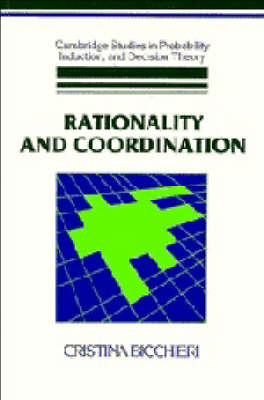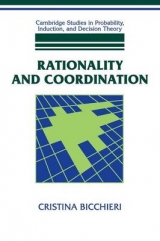
Rationality and Coordination
Seiten
1994
Cambridge University Press (Verlag)
978-0-521-38123-9 (ISBN)
Cambridge University Press (Verlag)
978-0-521-38123-9 (ISBN)
- Titel erscheint in neuer Auflage
- Artikel merken
Zu diesem Artikel existiert eine Nachauflage
This book explores how individual actions coordinate to produce unintended social consequences. In the past this phenomenon has been explained as the outcome of rational, self-interested individual behaviour. Professor Bicchieri shows that this is in no way a satisfying explanation. She discusses how much knowledge is needed by agents in order to coordinate successfully. If the answer is unbounded knowledge, then a whole variety of paradoxes arise. If the answer is very little knowledge, then there seems hardly any possibility of attaining coordination. The solution to coordination and cooperation is for agents to learn about each other. The author concludes that rationality must be supplemented by models of learning and by an evolutionary account of how social order (i.e. spontaneous coordinated behaviour) can persist.
1. Rationality and predictability; 2. Equilibrium; 3. Epistemic rationality; 4. Self-fulfilling theories; 5. Paradoxes of rationality; 6. Learning and norms: the case of cooperation.
| Erscheint lt. Verlag | 25.2.1994 |
|---|---|
| Reihe/Serie | Cambridge Studies in Probability, Induction and Decision Theory |
| Verlagsort | Cambridge |
| Sprache | englisch |
| Maße | 156 x 236 mm |
| Gewicht | 516 g |
| Themenwelt | Geisteswissenschaften ► Philosophie ► Erkenntnistheorie / Wissenschaftstheorie |
| Geisteswissenschaften ► Philosophie ► Logik | |
| ISBN-10 | 0-521-38123-1 / 0521381231 |
| ISBN-13 | 978-0-521-38123-9 / 9780521381239 |
| Zustand | Neuware |
| Haben Sie eine Frage zum Produkt? |
Mehr entdecken
aus dem Bereich
aus dem Bereich
die Grundlegung der modernen Philosophie
Buch | Softcover (2023)
C.H.Beck (Verlag)
18,00 €
Buch | Softcover (2023)
Reclam, Philipp (Verlag)
7,00 €


![Was heißt Denken?. Vorlesung Wintersemester 1951/52. [Was bedeutet das alles?] - Martin Heidegger](/media/113619842)
